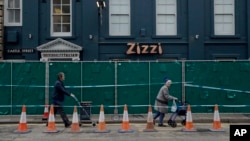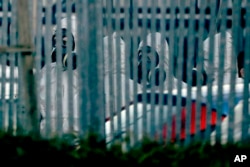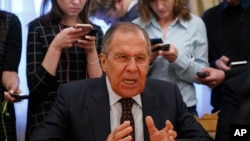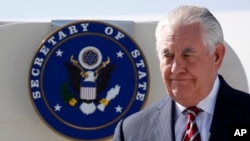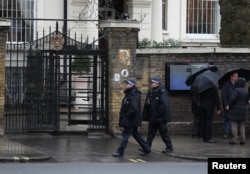U.S. President Donald Trump acknowledged Tuesday British evidence that the Russians may have been behind the poisoning of a former Russian spy and his daughter in England, but he stopped short of blaming Moscow "until we get the facts straight."
"It sounds to me like it would be Russia based on all the evidence they have," Trump told reporters outside the White House.
Trump spoke by phone Tuesday with British Prime Minister Theresa May about the attack in southern England on Sergei Skripal and his daughter, Yulia.
The White House said Trump agreed with May that Russia "must provide unambiguous answers" about how the weapon ended up being used in the U.K. They also agreed on "the need for consequences" for those responsible for the attack.
Britain gave Russia by the end of Tuesday to explain how the nerve agent developed by the Soviet Union was used to poison Skripal, a former Russian double agent who gave secrets to British intelligence officials.
If Russia does not comply with the request, May said Britain would take "extensive" retaliatory action.
Russian Foreign Minister Sergey Lavrov insisted Tuesday Moscow was "not to blame" and would only cooperate with a British investigation if it gets samples of the nerve agent that is believed to have been used. But Lavrov said requests for the samples had been rejected, which he said violates the Chemical Weapons Convention. The convention prohibits the production of chemical weapons.
Russia's foreign ministry said later Tuesday Moscow would retaliate for any sanctions Britain impose in response to the attack.
"Any threats will not remain unanswered," a ministry statement said.
Prime Minister May said it was "highly likely" Russia was behind the attacks and warned after meeting with members of her national security council that Britain would not tolerate such a "brazen attempt to murder innocent civilians on our soil." The Skripals remain hospitalized in critical condition in their home city of Salisbury in southern England.
Specialist bio- and chemical weapons teams have been working around the clock at the site of the March 4 attack.
On Monday, May told lawmakers the substance used to poison the Skripals belonged to a group of military-grade nerve agents known as "Novichock."
"Russia has previously produced this agent and would still be capable of doing so," May said. "Russia's record of conducting state-sponsored assassinations, and our assessment that Russia views some defectors as legitimate targets for assassinations, the government has concluded that it is highly likely that Russia was responsible for the act against Sergei and Yulia Skripal," she said.
"Either this was a direct act by the Russian state against our country, or the Russian government lost control of its potentially catastrophically damaging nerve agent, and allowed it to get into the hands of others," May said.
In a strongly worded statement released Monday by the State Department, former Secretary of State Rex Tillerson, who was fired by Trump on Tuesday, supported May's assertion that Russia was behind the attack.
"There is never a justification for this type of attack — the attempted murder of a private citizen on the soil of a sovereign nation — and we are outraged that Russia appears to have again engaged in such behavior," Tillerson said. "From Ukraine to Syria — and now the U.K. — Russia continues to be an irresponsible force of instability in the world, acting with open disregard for the sovereignty of other states and the life of their citizens."
The statement continued: "We agree that those responsible — both those who committed the crime and those who ordered it — must face appropriately serious consequences. We stand in solidarity with our Allies in the United Kingdom and will continue to coordinate closely our responses."
Expectations are growing for a tough response from May, said analyst Ian Bond, director of foreign affairs at the Center for European Reform.
"I think she'll be under a lot of pressure to show that the U.K. takes this very seriously. And that's partly because when she was home secretary, and indeed before that, the British reaction to the murder of [Russian defector] Alexander Litvinenko in London was seen as rather weak."
Britain's immediate response will likely be to expel some Russian embassy staff, said Bond.
"Getting rid of some identified intelligence officers in the Russian embassy. More importantly perhaps, we have a certain amount of financial leverage against those in [Russian President] Putin's circle, who have property or other assets in the U.K."
Other options being considered include boycotting the football World Cup in Russia this year and banning Kremlin state media, such as broadcaster Russia Today.
Investigators said Skripal and his daughter, who arrived from Russia the day before, drove to a shopping center in Salisbury, where they had a drink at a pub and dinner at a restaurant. About a half hour later, emergency personnel were called to assist the two, who were found in "extremely serious condition" on a bench near the shopping center. The police officer who was first on the scene also remains hospitalized.




